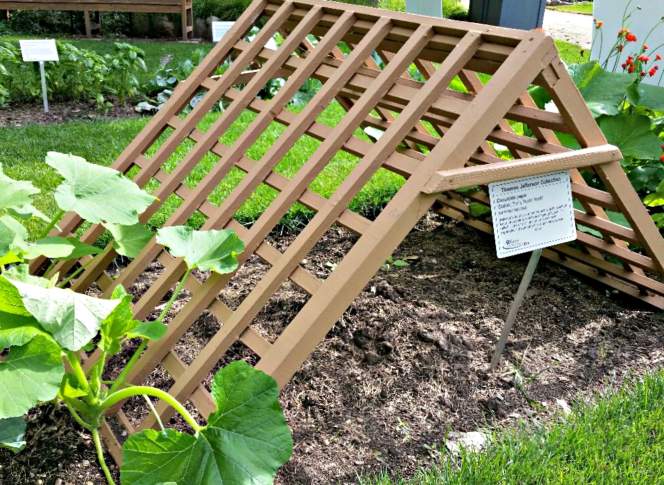How To Keep A Drenched Garden From Drowning
Rain is a welcome treat for many plants, but too much can cause plenty of problems in the garden.
July 7, 2017

Garden trellis for vine crops

Rain is a welcome treat for many plants, but too much can cause plenty of problems in the garden.
Plant diseases caused by bacteria and fungi flourish from prolonged leaf wetness and excess moisture around root zones. Too much rain, along with overcast skies, can slow plants’ growth and affect blossom production. Additionally, heavy rains leach vital nutrients from the soil that are relied on by plants.
The impact of excessive rain is not limited to plants. Foraging insects like honeybees and native pollinators may find it challenging to travel long distances during wet periods in search of pollen and nectar. Saturated garden grounds can also limit access to and enjoyment of plants, and it can take several days for water to drain from heavy soil.
While rain is unpreventable, and it may not be practicable to install a rainproof tent on a garden, there are some preventive measures that can be adapted to minimize the effect of too much moisture.
- Foot traffic on wet gardens should be avoided, especially between plant rows, as it can compact the soil and limit root growth. Spreading light mulch or installing stepping stones in the main aisle can provide accessibility to garden beds with minimum disturbance to the soil.
- Garden beds submerged in standing water for a prolonged time are often unsalvageable. It is usually best to build raised beds with a 1:1:1 ratio of compost, peat and perlite mixture, and start over with new plantings. Many vegetable crops are sensitive to excess moisture and can succumb to root rot infection. Plants may show a nutrient deficiency disorder like yellowing of leaves, and other symptoms of root rot include stunted growth and wilting. Additionally, seeded crops like pumpkin, sunflower, squash, sweet corn and beans may not germinate under saturated soil.
- Water can be diverted away from gardens in low-lying areas by placing barriers on slopes to divert water. Trenches can also channel water away from garden beds.
- Gardeners should monitor plants for signs of disease or infection. Common signs of leaf infection in vegetable crops includes leaf spots, large patches of browning and white powdery spores either on upper or lower surfaces of leaves. Infected leaves should be removed immediately, and can be diagnosed at a local University of Wisconsin-Extension office. Timely application of preventive fungicide is crucial to minimize the spread of fungal disease on the plant.
- Layered newspaper sheets covered with a thin layer of mulch around the base of tomatoes, peppers and eggplants can prevent soil splash up on plants’ lower leaves and stems. Lower sets of leaves should be trimmed if they are too close to the soil, as this will help minimize the spread of disease spores from the soil surface and allow better air flow movement near plant bases.
- Excess mulch should be raked around plant bases, with a maximum depth of 1-2 inches, to prevent soil erosion during wet periods. Excess mulch can prolong soil wetness and can lead to root rot infection.
- Training vine crops like tomatoes and cucumbers in a trellis or cage system will increase air flow around plants. Stakes can provide support to delicate plants when strong winds and rain hit.
- Fertilizer or pre-emergent herbicides should not be applied to vegetable crops if heavy rain is in the forecast in the next 24 hours.
- Slugs like to shelter in damp areas, so it is best to remove any of their hiding spots like wooden boards, flat stones, or large wood chips in the garden areas.
If a garden ends up being flooded, any produce may be contaminated by sewage, farm runoff or other pollutants. Depending on the timing of the flooding, some plants may be salvaged, but many items should be discarded. More information about flooding and food safety can be found at local UW-Extension offices.
Vijai Pandian is a horticultural agent and educator for the University of Wisconsin-Extension Brown County. This article is adapted from an item originally published by the Green Bay Press Gazette.
 Passport
Passport











Follow Us